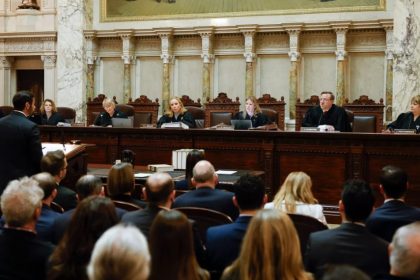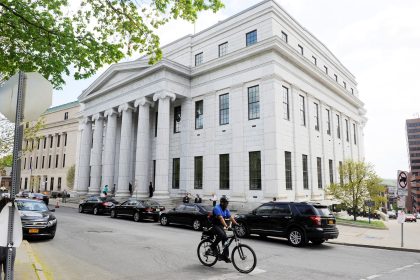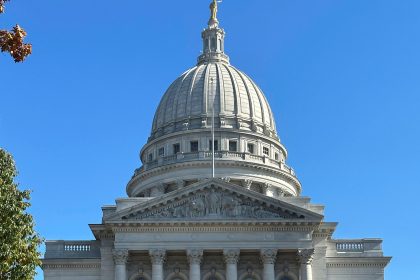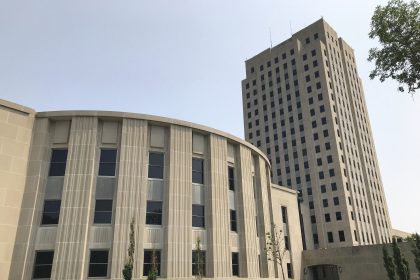Court Sets Off ‘MapQuake’ in New York, Orders Redistricting Do-Over

ALBANY, N.Y. — New York’s highest court ordered the state to redraw its congressional map on Tuesday, ruling in favor of the plaintiffs in a Democratic lawsuit, and potentially increasing the odds that Democrats will take back control of the House after the 2024 election.
The decision, penned for the court majority by Chief Judge Rowan D. Wilson, will likely enable Democratic lawmakers in the state to redraw as many as six districts currently represented by Republicans so that they’ll favor candidates from their own party.
And the icing on the cake is that the court-ordered redistricting is occurring during what is an ordinarily high-turnout presidential election year — years that typically favor Democrats in the Empire State.
According to a recent analysis by the Pew Research Center, roughly 53% of registered voters in the state currently identify as Democrats and lean toward the Democrats, while 25% identify as Republicans or lean Republican, and 19% say they have yet to pick a side.
While the court-ordered redrawing of the district lines will have some impact on every congressional race in the state, the changes would have a significant impact on the six districts that President Biden won in 2020, but which are now represented by Republicans.
The most prominent of these are Reps. Anthony D’Esposito and Nick LaLota, on Long Island, Mike Lawler, in the Lower Hudson Valley, Marc Molinaro, who represents the Catskills mountain region, and Brandon Williams, who represents the upstate district around the city of Syracuse.
While many of these contests were expected to be hotly contested anyway, prospective candidates now must face the prospect of potentially having to wait months before they find out the final shape of their district and the communities within it.
The case, Anthony S. Hoffmann, et al. v. New York State Independent Redistricting Commission, was one of the last and no doubt the biggest remaining legal challenges stemming from the redistricting that occurred throughout the country following the 2020 census.
In recent months the U.S. Supreme Court and several lower federal courts have ordered lawmakers in a number of Republican-controlled states to redraw district maps that were found to have diluted the power of Black voters.
Thanks to those decisions, it already looked as if the Democrats would have a slight national registration advantage over the Republicans.
Until Tuesday, however, that advantage was largely offset by Republican redistricting gains in North Carolina, where a recently elected conservative majority on the state Supreme Court gave its blessing to a map that could potentially see the GOP gain as many as four districts there.
The changes now anticipated in New York could very well make North Carolina’s Republican gains a wash on election night, tilting control of the House back to the Democrats.
It was all supposed to go so much differently in New York this year.
In 2014, years before the 2020 census was even conducted, New York voters had gone to the polls and approved a constitutional amendment creating a bipartisan commission to handle the political mapmaking duties.
The goal was to avoid a continuation of the long history of legal battles in the state stemming from redistricting. But if the goal of the amendment was laudable, its execution came up short. The panel ultimately deadlocked and never finished its work.
Shortly thereafter, the Democratically controlled state Legislature stepped in and adopted its own map, causing the Republicans in the chamber to sue.
The court of appeals held the Democratic map was an unconstitutional gerrymander, and hired a special master to act as an impartial cartographer and draw a replacement map.
Less than a month later, the state Supreme Court certified the special master’s work and approved his versions of what the Court of Appeals calls “the official approved 2022 congressional map and the 2022 state Senate map.”
Five weeks after that, having reviewed the map in detail and seeing what it could portend, a group of 10 Democratic voters, backed by the Democratic Congressional Campaign Committee and represented by the Elias Law Group, whose caseload is often filled with Democratic clients, sued, arguing that by failing to agree on an acceptable map the redistricting commission had failed to fulfill its constitutional duty.
“According to petitioners, the IRC continues to have that, even though the 2022 congressional map was judicially adopted,” Tuesday’s ruling says.
Republicans pushed back hard, arguing among other things, that Democrats would engage in a “festival of gerrymandering” if the court abandoned the special master’s map and let the Democrats take another crack at it.
In the meantime, in the first election held using the special master’s map, Republicans flipped four districts and claimed nearly half — 11 out of 26 — of the state’s congressional seats.
The Court of Appeals on Tuesday rejected that and other Republican arguments.
“The people of New York are entitled to the process set out in the Constitution, for which they voted,” Wilson wrote. “That process may include a directed creation of districts that is limited expressly to the ‘extent’ that the court is ‘required’ to do so … but not at the expense of the IRC process when time exists to follow that process.
“There is no good argument as to why New Yorkers must be prohibited from ordering the creation of legislative districts through the process the Constitution requires, adopted by the direct vote of the people,” he continued. “Underlying all the dissent’s rhetoric is a complaint that this court is forcing the IRC and Legislature to follow the Constitution.
“Reduced to its essence, the dissent’s and appellants’ arguments are that we should not pursue the IRC process because it will never work: ordering the IRC to deliver the required maps and implementing legislation will produce gamesmanship, a never-ending cycle of litigation, and ensure that ‘politics triumphs over free and fair elections,’” Wilson said.
“But that is precisely what New York faced for decades before the 2014 constitutional amendments and it was the very reason the IRC process was adopted,” he wrote. “To allow the IRC to defeat the Constitution encourages gamesmanship and defeats the popular will. Indeed, if we allow the IRC’s lack of compliance to stand, we would incentivize the same conduct that deadlocked the IRC and led to court-ordered redistricting.”
By a four-to-three vote, the court ordered the redistricting commission to reconvene to finish its work, and to do so no later than Feb. 28.
Among those writing in dissent from the majority was Judge Anthony Cannataro, who noted that it was “less than a decade ago” the “people of the state amended the New York Constitution to mandate that partisanship be kept out of the decennial redistricting process.”
“At their first opportunity, the Independent Redistricting Commission and Legislature failed to follow the constitutional process for enacting redistricting legislation and disobeyed the Constitution’s anti-gerrymandering mandate, requiring this court to act,” Cannataro wrote.
“Redistricting plans were drafted by a neutral special master … certified by the Supreme Court, and then used in the 2022 election, producing a fair and competitive election consistent with the overarching goals of the 2014 constitutional reforms prohibiting gerrymandering,” he said.
“Today, even though the constitutionality of the existing district lines has not been substantively challenged, the majority reverses course,” Cannataro said.
“The judiciary’s long history of safeguarding New Yorkers’ right to free and fair elections as the problem in need of correction — with political gerrymandering meriting barely any mention in the majority decision — the court today strictly curtails the constitutional authority of the judiciary to remedy future legislative overreach, rewriting the Constitution in order to do so,” he continued.
“Under the plain language of the Constitution, the maps we ordered … must remain ‘in force until the effective date of a plan based upon the subsequent federal decennial census … unless modified pursuant to court order’ to remedy a violation of law.
“Since the only violation of law alleged in this proceeding is the previous breakdown of the redistricting process this court remedied … there is no constitutional basis for this court to order a new congressional map.
“The majority’s holding to the contrary manufactures a new violation of law … [and] rewards petitioners for their inexcusable and strategic delay in commencing this proceeding, and elevates a failed process above the people’s substantive rights to free and fair elections,” Cannataro wrote.
Democrats were overjoyed by the majority’s decision.
Rep. Suzan DelBene, D-Wash., chair of the Democratic Congressional Campaign Committee, said in a statement that the decision “is a win for democracy and particularly the people of New York.”
“We are eager for the Independent Redistricting Commission to get back to work to create a new, fair congressional map — through the process New York voters intended,” she said.
John Bisognano, president of the National Democratic Redistricting Committee, also applauded the decision, calling it a “victory for New Yorkers.”
“As a result of this decision, the map-drawing process goes back to the New York State Independent Redistricting Commission, as the people of New York intended, so it can now fulfill its constitutional duty to draw a second congressional map,” Bisognano said.
“The 2020 census data demonstrated that New York has become more urban and diverse over the past decade and less rural,” he continued. “I am confident that the independent commission can conduct a transparent process that will lead to a congressional map that more accurately reflects trends of the state’s census data and the will of the voters. Now it’s time for the commission to get to work on behalf of the voters in time for the 2024 election.”
The rub for Republicans is that while the panel — which has an equal number of members from each party — could come up with a map everyone agrees is fair, under the New York State Constitution, the finished product would still have to be reviewed, potentially amended and approved by the Legislature, which, as already stated, is controlled by the Democrats.
Republicans have already vowed to challenge any new map they believe violates the gerrymandering ban, raising the specter of another protracted legal battle.
Savannah Viar, a spokeswoman for the National Republican Congressional Committee, said the organization is “disappointed but not surprised by the court’s decision to allow Democrats a second attempt at gerrymandering the maps.”
“Instead of focusing on policies that appeal to everyday voters, Democrats are trying to cheat their way to power. We will continue to hold them and their terrible policies — that have led to an open border, rising crime and rampant inflation — accountable,” she said.
Meanwhile, Aaron Evans, a longtime GOP strategist and president of Winning Republican Strategies, said in a statement provided to The Well News, “This new House maps decision comes after fair maps were drawn and New York voters rejected the extreme policies of out-of-touch progressives last cycle.
“It’s no surprise that Gov. [Kathy] Hochul spearheaded the effort to take away the voice of New York voters through further gerrymandering,” Evans said.
“Instead of adapting their radical policies to the will of voters, New York Democrats are yet again attempting to change the district lines,” Evans continued. “Voters should be able to choose their elected officials; elected officials should not choose their voters. Despite Albany elites’ attempts to silence their opposition, New Yorkers are resilient and intelligent enough to remember how hard Democrats worked to take away their voice when they cast their votes next year.”
In a joint statement, House GOP Conference Chair Elise Stefanik, R-N.Y., and New York Republican Party Chairman Ed Cox said the court’s decision was “plainly wrong” in regard to both the Constitution and the law.
“In their relentless pursuit of power at all costs, corrupt Democrats in Albany and Washington have politicized the Court of Appeals. Its once esteemed reputation is in tatters,” Stefanik and Cox wrote.
“The decision today opens the door for Democrats to rig our congressional district lines so that elections are decided not by the voters, but by politicians in a back room,” they said. “New York Republicans will not give up the fight against gerrymandering and for free and fair elections. The people of New York deserve better than this.”
Dan can be reached at [email protected] and @DanMcCue
























